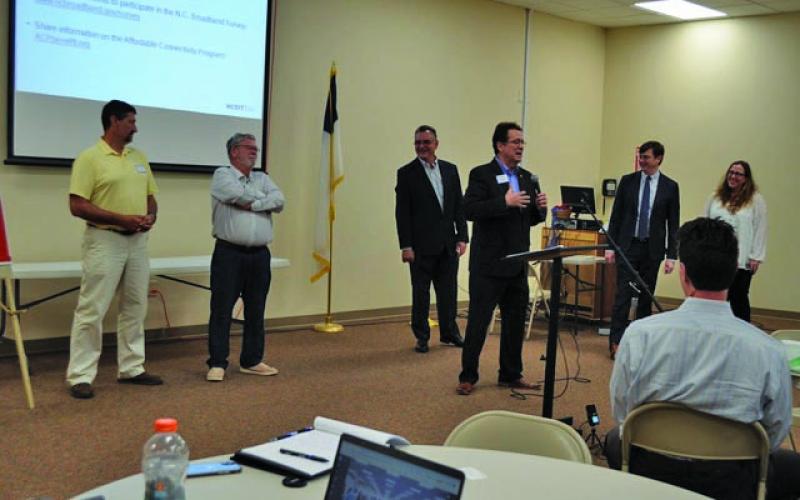Representatives from across Western North Carolina gathered in Franklin Monday afternoon to hear an update from the state on the nearly $1 billion in funding available for broadband expansion.
Anyone living in the far western counties of the state knows getting reliable internet access is a challenge, and the pandemic highlighted the lack of service even more. In many homes there just wasn’t adequate service for kids learning remotely, parents working at the dining room table, telemedicine visits and Zoom meetings.
“Every walk of life needs internet connection,” said Nate Denny, deputy secretary of broadband and digital equity who participated in the meeting along with Angie Bailey, director of the state Broadband Infrastructure Office. Digital providers were also given the opportunity to share what their companies are doing to improve service throughout the region.
Sen. Kevin Corbin (R-Macon) organized the meeting held at Holly Springs Baptist Church along with Rep. Karl Gillespie (R-Macon), Rep. Mark Pless (R-Haywood) and Rep. Mike Clampitt (R-Swain).
Corbin said they often hear people say their neighbor across the road has internet service, but they don’t have service at their house, and now there is money in the budget to fix that.
The state has allocated $971 million to ensure availability of internet service at speeds of at least 100/20 Mbps for more than 98 percent of North Carolina households.
The funds are earmarked as follows:
• $380 million GREAT Grant funding (includes $350 million in American Rescue Plan funding)
• $400 million Completing Access to Broadband (CAB/requires matching funds from county)
• $90 million Stop Gap Solutions
• $100 million Broadband Make Ready Accelerator (pole replacement fund)
• $1 million broadband mapping
Additionally, $50 million has been set aside for awareness and digital literacy and $15 million to supplement existing state administrative capacity to support high-speed internet efforts.
“We need to make sure we get our share of the money west of Asheville,” Corbin said.
The senator said the purpose of the meeting was to bring city and county leaders together with providers to learn how they can partner to extend broadband service to unserved and underserved areas. Even people with existing service will benefit as one of the goals is to increase internet speeds as well as accessibility.
Since 2015, the Federal Communications Commission has set minimum broadband service at a speed of 25 megabites (Mgbs) per second download and 3 Mgps upload. “We need to get beyond that old federal definition,” Denny said, adding that faster speeds are essential in closing the “homework gap” – the access students need for remote learning or even to complete daily homework assignments.
Bailey said the GREAT Grant funding will help move service to a required minimum speed of 100/20, and it must be consistently reliable service.
“Having the funding available really changes the opportunity,” she said. “We’ve not had this level of funding before.”
The state is currently accepting GREAT Grant applications through April 4. Grants awarded in June must be up and running in two years. GREAT grants are awarded to broadband service providers and are used to deploy last-mile infrastructure to unserved areas. The maximum grant is $4 million.
“We can solve this problem over the next five or six years in North Carolina,” Denny said.
While ARP funds must be used by 2026, some of the other federal funding has a six-year window. Corbin said he would like to see the improvements sooner rather than later. To put it in perspective, he said a child in sixth grade now will be graduating in six years. “That’s too long.”
Denny said not only is the goal to extend the infrastructure to make internet service more accessible, but also to make it affordable. There are instances where families may have access to the internet but can’t afford or don’t have the computers and other technology they need.
Qualifying households can apply to the Affordable Connectivity Program, which provides
• Up to $30/month discount for qualifying households
• Up to a$75/month discount if your household is on Tribal lands
• A one-time discount of up to $100 for a laptop, tablet or desktop computer (with a co-payment of more than $10 but less than $50).
Denny and Bailey stressed the importance of mapping and getting accurate data as key parts of the broadband programs and grant funding distribution. They encouraged people to complete the state’s broadband survey so they can maintain up-to-date information. The survey is available at ncbroadband.gov/north-carolina-broadband-survey. If you do not have internet service, call 919-750-0533 to take the survey by phone.
More information about the state’s broadband programs and the Division of Broadband and Digital Equity is available at ncbroadband.gov. To learn more about the Affordable Connectivity Program, visit ACPBenefit.org.
- By Mia Overton/The Franklin Press

